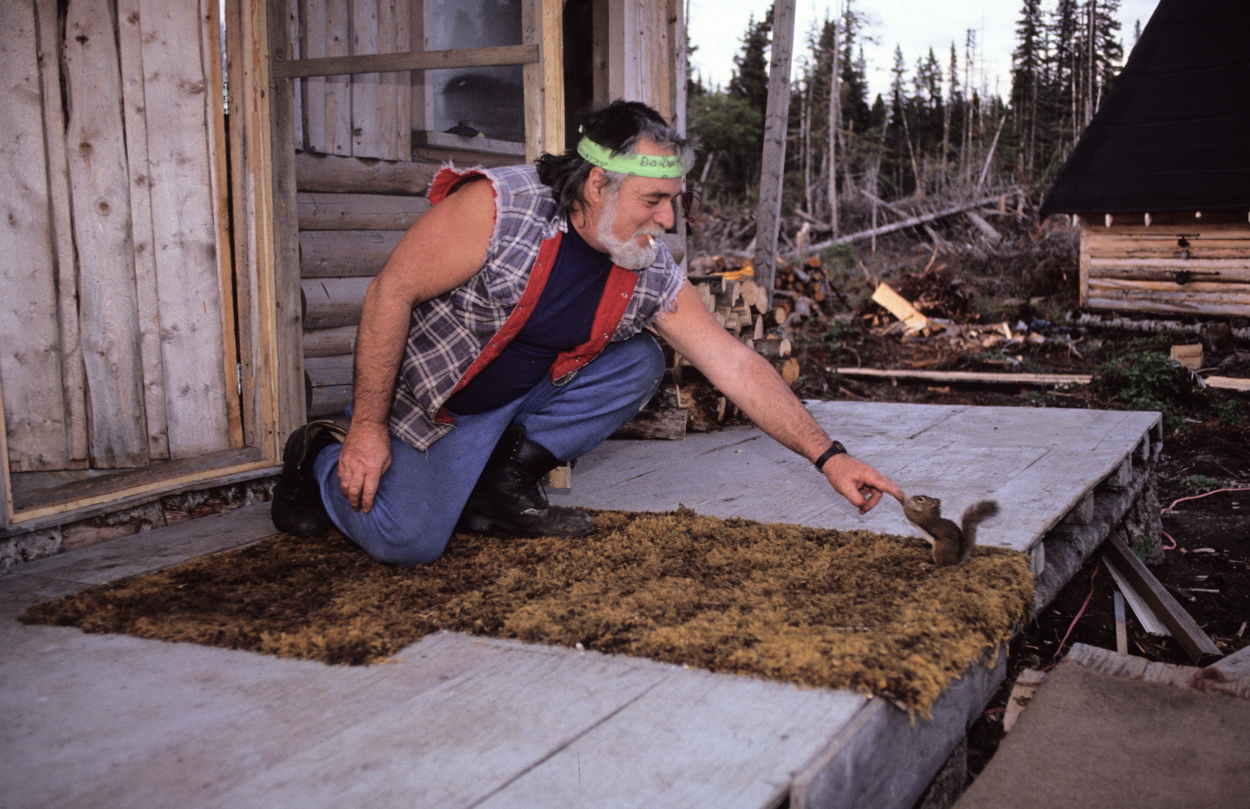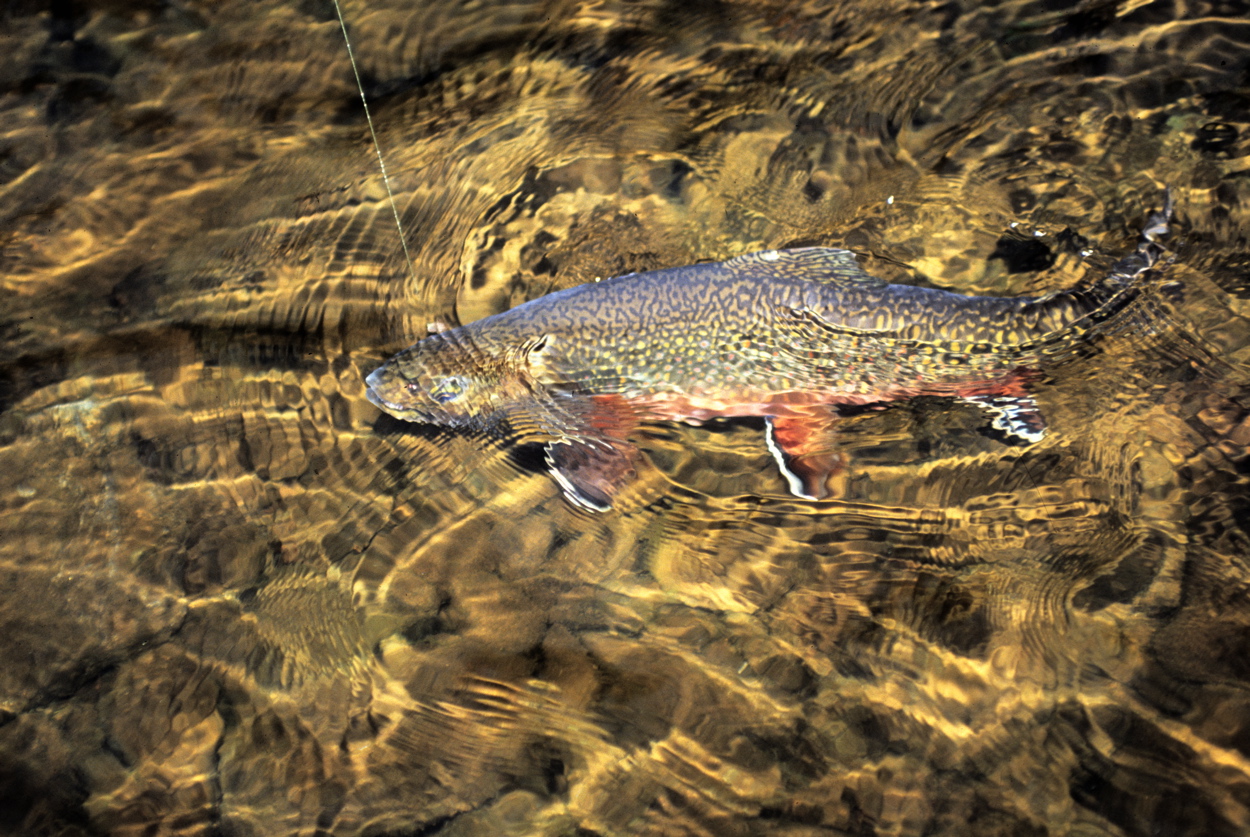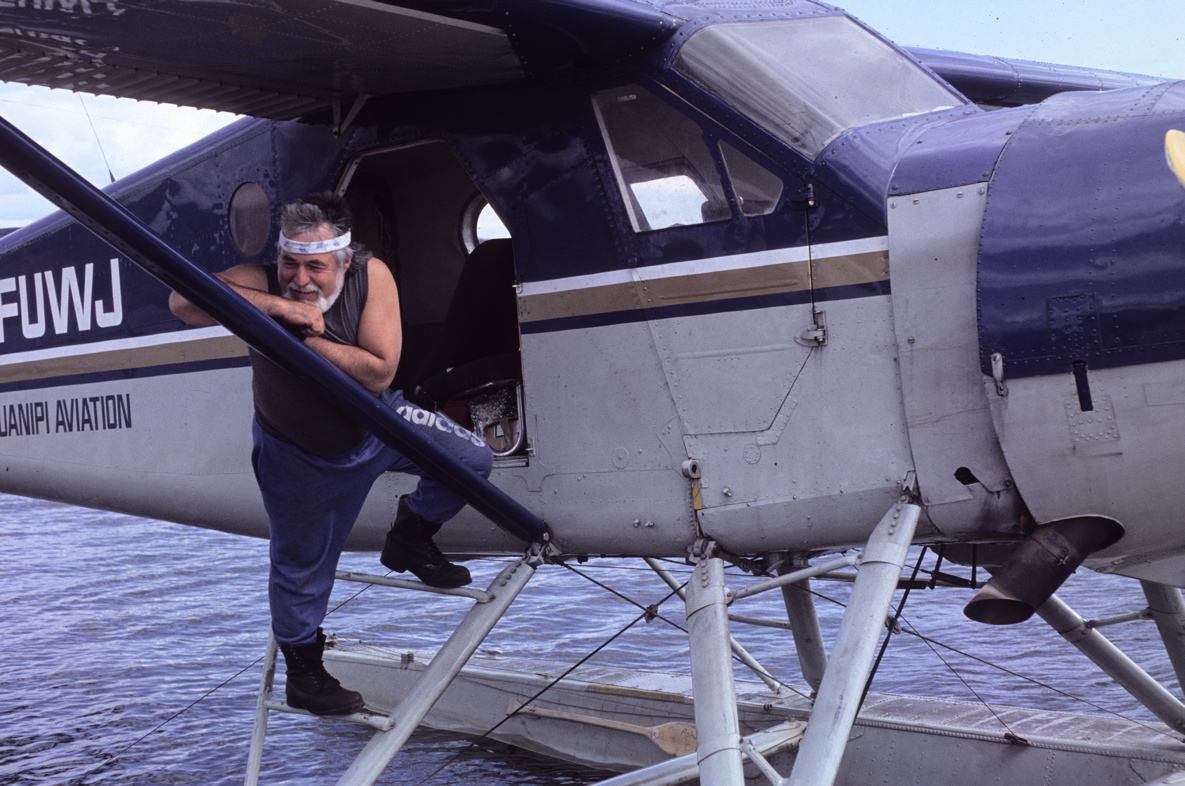Labrador: Golden Speckles, Northern Lights
Bevaer Over The Lodge
“In the golden afternoon light of early August, the Speckles are feeding on huge, blue mayflies.”
Yves, Beaver
“Two days before he flew into the teeth of a storm to spare us a cold wet night huddled under a sheet of visqueen.”
CLAUDE LeBlanc & A Squirrel
“More ominous, however, is the young black bear cub she must drive away from the garbage.”
Jim Muise, Speckle
Yves, SPECKLE
Northern Lights offers a variety of packages and fishing sites. Northern light furnishes blankets, all meals and some tackle. Anglers are advised to bring a large selection of lures, flies and leader. A six weight fly rod is sufficient to handle most fish.
Northern Light
Fishing Lodge
P.O. Box 279
Labrador City, Labrador
A2V 2K5
Tel: (709) 944-7475
office@labrador-frontier.com
Labrador & Newfoundland
newfoundlandlabrador.com
Only the fishing impaired deserve a moment such as this. Only those who have sweated beneath a hot sun or shivered beneath an icy moon, who have cast to trout, salmon and bass and been skunked by all merit this twenty minutes in Labrador. Standing on a boulder in the middle of a nameless river that swirls like hot oil, I am surrounded by rising Speckles–brilliant, broad backed fish that, until this moment have never seen a dry fly.
In the golden afternoon light of early August, the Speckles are feeding on huge, blue mayflies. With their erect wings crowding the river’s slick surface, they resemble tiny sloops on a crosswind tack. Now is not the time for fragile leaders or microscopic flies. I am down to a single strand of twelve pound monofilament and the biggest hair fly in my box. Tying on my last Gray Wulff, I cast upstream, strip the slack and study the drift. A second later, the fly cascades into an enormous dimple. Lifting the rod tip, I feel weight. The reel sheds line in a sudden, startled screech, the rod arcs toward the surface and I nearly fall off the boulder.
Watching from shore, Yves St. Marie who owns Northern Lights tells me, “You must climb out of the water.”
Golden Speckle
Trying to avoid eye contact, I reply, “Yves, one more after this!”
“You said that about the last one.” he reminds me.
At 5’7″ and 170 pounds, with thick gray hair and a fine Gallic nose, Yves owes a genetic debt to the Voyageurs–those Quebucois who, in the process of trapping, trading and bringing religion to Canada’s fractious natives, explored the Pacific Northwest.
Set on an isthmus between Shaw Lake and the Asuanapi River, “Northern Lights Fishing Lodge” is surrounded by a vast wilderness filled with remote lakes, virgin forests, wide rivers and North America’s largest Caribou herd. In the forty minutes it takes to fly from Labrador City to Shaw Lake, it is impossible to tell whether the verdant spruce forests pushed up through a vast inland sea, or if in fact, the sea flooded the forests. I prefer to believe the later. Studying the caribou trails which spider web through the bogs, rolling hills and old burns between the lakes and rivers, the land appears unchanged since the glaciers receded.
By floating in a sawmill and cutting the native spruce, Yves and five guides took six weeks to build the lodge and three log cabins which are equipped with running water, flush toilets, wood burning stoves and hot water showers. Northern Lights combined dozen river permits and isolation pays dividends. With a maximum of eight fisherman per week, and fifteen minute flights to the rivers (which are all catch and release) an average of sixty fisherman per summer will cast to thousands of big fish.
Glancing up river toward the Beaver that is idling into a north wind, he adds, “Claude is ready to fly.”
Claude LeBlanc, Beaver
I owe Claude LeBlanc. With 12,000 hours in Beavers, Otters, Cessna 210s and Norseman, during the past four days he has proved to be an amazing pilot. Two days before he flew into the teeth of a storm to spare us a cold wet night huddled under a sheet of visqueen. Part Indian, part French Quebucois, Claude dresses in sleeveless T shirts, Nike sweat pants and head bands with Osprey feathers. He can discuss the culinary differences between wolves, foxes and dogs and once soaked a crow in milk for a day, then cooked it in wine and herbs for two more, took one bite and fed it to the cat. The only thing he refuses to eat is otter after one made him sick for a week. Looking back, he thinks it was “someting’ in da’otter’s fat.”
Though you won’t find the name in any guide to North American Fish, a “Speckle” is Labrador’s Brook Trout. And that’s where the similarity ends. Along the East’s fabled chalk streams, a fourteen inch Brook is a heavyweight freak. In the rivers around Northern Lights Fishing Lodge, Speckles average twenty inches and four pounds with trophies eclipsing seven pounds.
A seven pound brook trout? By size alone, Brooks and Speckles don’t even belong to the same species, except in one way. While Brook Trout are notoriously aggressive, Speckles will rip into deer hair flies with a voraciousness–even viciousness–that owes everything to Labrador’s short but spectacular summer.
Standing on shore Yves invokes the camp cook. “Andy,” he calls across the fifty feet that separate us, “Josie is also waiting. Dinner is growing cold!”
Young Black Bear
Between Josie Stoke’s home made breads and biscuits I have gained five pounds in six days. Josie has a thousand stories, two cats and a young red squirrel that will climb your leg to beg for crackers and peanut butter. More ominous, however, is the young black bear cub she must drive away from the garbage. The season before, after living on garbage and leftovers, the mother forced two guests and a guide to spend the night in a fourteen foot aluminum boat. The guides were forced to shoot her and now Josie worries that the cub is learning similar bad habits.
Despite record high water and changeable weather, during the past week, the fishing has been spectacular. The first day I hooked a dozen Speckles over three pounds. On day two, along with a similar number of Speckles we hooked but lost a fourteen pound Ounaniche, (labrador’s huge land locked salmon). On the fourth day we landed a dozen Lake Trout with the largest weighing over twenty pounds. This last day, however, surpasses it all.
The fish races past me, and holding the rod up, I struggle to keep from falling in.
“If you get wet, I will have no sympathy for you.” Yves insists, without anger.
Yves is a conservationist who loves Labrador’s Speckles and is ready to fight to protect them. He believes an outfitter’s role is to preserve and protect the resource and condemns renegade guides who kill the maximum limits, lack insurance and spoil the image of Labrador. Because a Speckle takes a dozen years to reach seven pounds, Yves insists that fisherman cannot continue to kill the large breeders and still maintain the fishery. He thus encourages fly fishing only catch and release with one trophy fish allowed per client.
Now, Yves watches the rod bend in half and asks. “Is it a big fish?”
“Yes, I think very big….” I reply, reeling rapidly as the trout turns toward me.
“Maybe too many big pike in this river,” Yves observes, watching the trout fight on the surface. “Eat any’ting smaller ‘den fourteen inches.”
The five pound Speckle slips into the eddy behind my waders. In succession, I remove the barbless hook, release the heavy trout and quickly cast to dry the fly. With huge Speckles rising around me, I refuse to abandon the boulder. Calling to Yves over my shoulder, I rashly suggest, “Leave me Jim Muise’s visqueen for a tent and pick me up in the morning.”
A Newfoundlander by birth, and Atlantic Salmon Fly Fisherman by addiction, guide Jim Muise is an artist with a fly rod. Wearing a perpetual two day growth and impervious to cold, the guide’s patois, turns “thing” to “ting” “we fish” to “we fishes,” ‘have” to “‘ave” “here” to “‘ear.” Muise had earlier explained. “Them explorers went foolish with the mosquitoes….just stripped themselves naked and dived in mud bogs. Only left their eyes and nose exposed! Nowadays we got the spray,” he nodded to aerosol can in my fishing vest. “Myself, I figures the longer you waits to use the spray, the better your immunity works.”
With no food, no sleeping bag, rain on the horizon and Labrador’s black flies and mosquitoes beginning to penetrate the 100% deet (which will melt plastic off watches, reels and cameras like a butane torch) I sense, like the rest of the week, this could be a night to remember.
At that point a Speckle’s brilliant head appears beneath the Gray Wulff and I set the hook. A loud shriek issues from the reel.
“One more fish after this one!” I yell, knowing that Yves is a fisherman and will, eventually, forgive me.
Turning toward the Beaver, Eve replies. “Next year we will have time to explore other rivers with larger Speckles than these, but we must go now.” And with the promise competing with the rising trout, I horse the fish in, remove the hook and carefully slide off the boulder.
A few minutes later, the Beaver howls up river into the wind. To break the surface tension, Claude Leblanc rocks onto one pontoon and with the big radial deafening any conversation, we slowly lift into the air.



